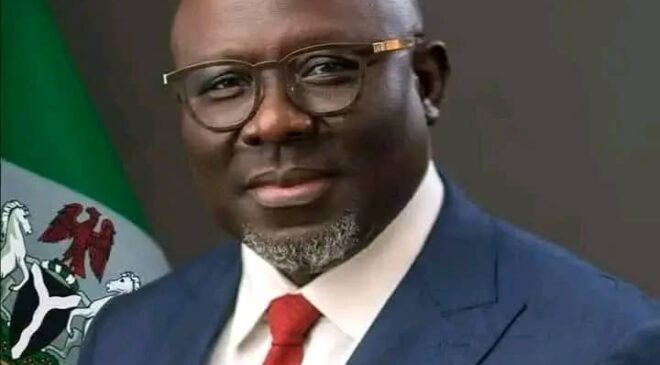
ASABA/Nigeria: The Delta State Commissioner for Works (Rural Roads) and Public Information, Mr. Charles Aniagwu, has explained that Governor Sheriff Oborevwori’s recent defection from the Peoples Democratic Party (PDP) to the All Progressives Congress (APC) was a calculated and strategic move designed to advance Delta State’s development and strengthen its partnership with the federal government.
Speaking during a live interview on TVC’s Politics Tonight on Friday, Aniagwu described the governor’s political shift as “a necessary adjustment to the changing political climate,” emphasizing that it was made in the best interest of the state rather than for personal or partisan gain.
“We noticed a change in the taste of the palm wine, and it became necessary to adjust our drinking pattern,” Aniagwu said metaphorically. “That was what we did, taking a look at what was happening in the PDP. From what we have seen since that time, our governor saw tomorrow.”
According to Aniagwu, Governor Oborevwori’s defection earlier this year was guided by a pragmatic understanding of national politics and the need to align Delta State with a federal administration that has shown readiness to support its development agenda.
“Even while we were in the PDP, there was love,” the commissioner noted. “But becoming a member of the same political family with President Bola Ahmed Tinubu has created a new level of partnership and progress. Politics, after all, is local, and if this new alignment benefits our people, it is the right step to take.”
Aniagwu revealed that since the governor’s entry into the APC in April, Delta State has enjoyed increased federal attention, with stronger collaboration between both levels of government on major infrastructural and economic projects.
Responding to concerns about internal tensions within the Delta APC following the governor’s defection, Aniagwu acknowledged that the merging of old APC members with new entrants from the PDP naturally came with divergent interests but stressed that Governor Oborevwori had worked tirelessly to harmonize these differences.
“You don’t expect that the moment you move in, everybody will be on the same page,” he said. “But what the governor has done since April 28 is to manage these interests, calm frayed nerves, and bring a lot of people together.”
He dismissed claims by some APC stakeholders that the governor’s loyalists were sidelining older party members, describing such allegations as exaggerated and politically motivated. “That someone comes on TV to express grievances does not mean he is bitter,” Aniagwu stated. “Democracy offers everyone the right to speak. What matters is that, at the end of the day, we all move in one direction.”
Addressing reports of “kangaroo suspensions” of APC officials in some local governments, including Ughelli North and Ethiope West, Aniagwu maintained that the governor had no hand in such actions. “If a local government party chairman is not doing what he is supposed to do, the people in that local government have the power to act,” he explained. “That does not mean the governor is interfering. The processes of the party must be respected.”
Highlighting Governor Oborevwori’s performance since assuming office, Aniagwu said the administration had sustained its developmental momentum and even intensified its infrastructure drive after joining the APC. He cited the recent approval of major infrastructure projects, including the ₦59 billion flyover at Uromi Junction in Agbor and another ₦39 billion flyover at Otovwodo Junction in Ughelli, both awarded to Julius Berger Nigeria Plc, as proof of the government’s commitment to meaningful development.
“From day one, Oborevwori has maintained his speed in making Delta a more livable state,” Aniagwu said. “He has not looked back; instead, he increases the momentum every day.”
He reiterated that the state’s APC remains united and focused on supporting President Tinubu’s administration while consolidating the governor’s political base ahead of the 2027 general elections. “We are now all children of one parent — the APC,” he said. “There will always be different interests, but what matters is consensus. Politics is not about uniformity; it is about collective progress.”
Aniagwu emphasized that Governor Oborevwori’s decision to switch parties was a deliberate act of leadership aimed at positioning Delta for greater federal support and inclusion in national development programs.
“The governor’s decision was not about personal gain,” Aniagwu said. “It was about ensuring Delta State continues to grow, attract investments, and benefit from national opportunities. And so far, the results speak for themselves.”
